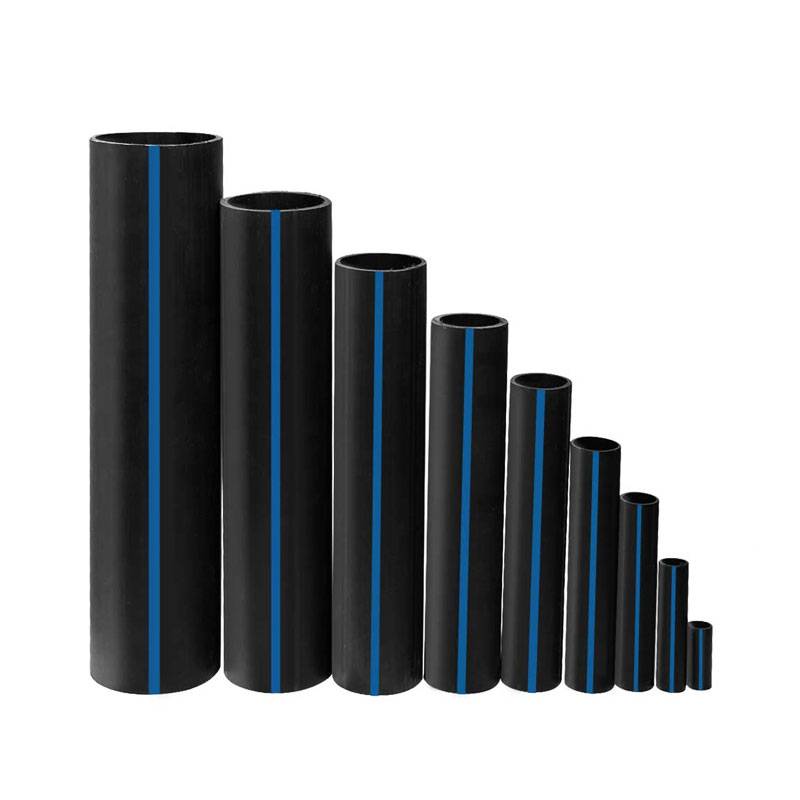American Plastics HDPE Pipe for Oilfield: Trusted by Engineers
Wiki Article
Recognizing the Key Conveniences of HDPE Pipe for Water and Wastewater Management
The usage of HDPE pipeline in water and wastewater monitoring offers various benefits that merit consideration. Its outstanding sturdiness and long lifespan make it a recommended selection for several jobs. Additionally, the material's resistance to deterioration and chemical damages improves its integrity in various settings. The benefits expand beyond simply long life and resistance. Midland TX HDPE Pipe Fittings in Stock. Discovering its cost-effectiveness and ecological impact reveals much more compelling factors for its extensive fostering in modern infrastructureRemarkable Toughness and Long Life

HDPE pipe sticks out for its outstanding longevity and durability, making it a recommended choice in water administration systems. Created from high-density polyethylene, these pipes can withstand considerable pressure and stress and anxiety, guaranteeing reliable efficiency over time. Their durable nature enables them to withstand severe environmental problems, consisting of temperature fluctuations and dirt activities, which can cause other materials to stop working.
The lifespan of HDPE pipelines commonly goes beyond half a century, offering an economical remedy for towns and industries alike. Additionally, the material's lightweight properties simplify installation, lowering labor costs and timeframes. This sturdiness decreases the requirement for regular fixings or replacements, better improving its economic allure.
In water management applications, the reliability of HDPE pipes means less interruptions and enhanced service connection, making them important to sustainable framework growth. The combination of sturdiness and durability solidifies HDPE's function as a cornerstone in reliable water monitoring services.

Resistance to Corrosion and Chemical Damages
While numerous materials succumb to corrosion and chemical damage with time, HDPE pipes exhibit exceptional resistance, making them excellent for different water administration applications. This durability comes from the molecular framework of high-density polyethylene, which is inherently non-reactive and does not wear away like steels or degrade from direct exposure to rough chemicals. As an outcome, HDPE is extremely reliable in atmospheres with aggressive compounds, such as wastewater systems that may consist of acids, bases, and organic solvents.
Furthermore, HDPE pipes can withstand environmental variables such as soil level of acidity and saline problems, additionally enhancing their viability for diverse applications (Texas hdpe pipe manufacturer). Their capability to preserve structural honesty gradually decreases the danger of leaks and failures, which is important in making sure the safety and security and reliability of water distribution and wastewater administration systems. The resistance to corrosion and chemical damages markedly contributes to the general effectiveness and longevity of HDPE piping solutions.
Cost-Effectiveness and Financial Benefits
When taking into consideration the economic ramifications of water administration systems, the cost-effectiveness of HDPE pipelines ends up being obvious. These pipes use lower setup and maintenance prices compared to traditional materials like steel or concrete. Their lightweight nature simplifies transport and setup, resulting in decreased labor expenses. In addition, HDPE pipes exhibit a long life expectancy, typically surpassing 50 years, which translates to fewer replacements and long-lasting cost savings.Additionally, the resistance of HDPE to rust and chemical damage reduces the demand for costly repairs and substitutes. The pipes likewise sustain reliable water circulation, lowering energy costs associated with pumping systems. By reducing leaks and water loss, HDPE pipelines add to substantial financial benefits for towns and industries alike. On the whole, the initial investment in HDPE piping can yield substantial monetary returns over the lifespan of the water administration system, making it a sensible option for sustainable facilities development.
Ecological Sustainability and Reduced Effect

Convenience and Adaptability in Installation
As a result of their unique buildings, HDPE pipes provide remarkable versatility and flexibility in installment, making them appropriate for a broad array of applications. Their light-weight nature permits less complicated handling and transport, minimizing labor prices and setup time. HDPE Full Article pipes can be bent and shaped to fit different surfaces and project needs, which is particularly beneficial in testing settings.Additionally, their resistance to deterioration and chemical damage enables installment in diverse setups without the requirement for specialized safety layers. The ability to fuse joints creates a constant, leak-free system, improving the general honesty and reliability of the setup. HDPE's versatility also suits ground movement, decreasing the threat of damage in locations vulnerable to shifting soil. In general, these features make HDPE pipes not just functional but likewise a favored choice for water and wastewater administration systems.
Frequently Asked Inquiries
Just How Does HDPE Pipe Compare to PVC in Water Monitoring Applications?
HDPE pipe provides premium flexibility, resistance to rust, and longevity contrasted to PVC. Its lighter weight helps with easier setup, while its lengthy life-span minimizes replacement prices, making HDPE a recommended option in water management applications.What Is the Lifespan of HDPE Water Lines Under Common Problems?
Under typical conditions, HDPE pipes can have a lifespan ranging from 50 to 100 years. Their durability and resistance to rust add to their long-lasting performance in different applications, making them a dependable choice for framework.Are HDPE Pipeline Recyclable After Their Life Span?
Yes, HDPE pipelines are recyclable after their life span. Midland TX HDPE Pipe Fittings in Stock. They can be refined and repurposed right into brand-new products, substantially minimizing environmental influence and promoting sustainability within the market, making them an environment-friendly selection for piping optionsWhat Is the Installment Process for HDPE Piping?
The installation procedure for HDPE pipelines involves site prep work, trenching, pipeline combination or mechanical signing up with, backfilling, and pressure testing. Proper techniques guarantee a durable and efficient system for transferring water and wastewater properly.Can HDPE Piping Be Made Use Of for Both Drinkable and Non-Potable Water Systems?
Yes, HDPE pipes can be made use of for both safe and clean and non-potable water supply. Their flexibility, toughness, and resistance to deterioration make them appropriate for various Our site applications, ensuring safe and efficient transport of water in different contexts.Report this wiki page